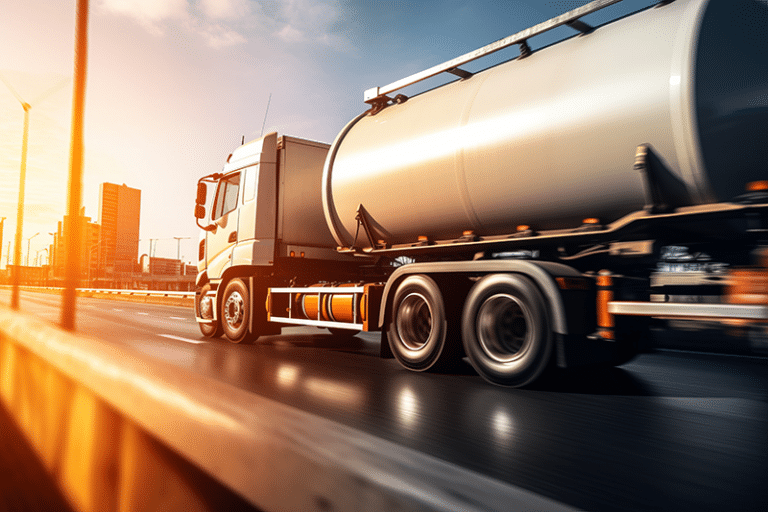Discover the critical role trucking plays in the transport of natural gas from extraction sites to consumers. We dive into the processes, safety measures, and advantages of using trucks over pipelines for this critical task.
In a world increasingly reliant on natural gas for heating, cooking, and electricity, the trucking industry emerges as a crucial player. Trucks are not just vehicles; they are the lifelines that connect the hidden treasures of natural gas buried underground to our everyday lives. This guide unpacks the step-by-step journey of natural gas, emphasizing the efficiency and reliability of trucks as the medium of choice for transportation.
Key Segments in The Trucking Transport of Natural Gas
- Beginning with Extraction: The journey starts beneath the earth’s surface, where natural gas lies in reserves. Post-extraction, it’s cleaned and processed to eliminate impurities, ensuring it’s ready for consumer use.
- Compression Preps for Transport: To make natural gas more accessible to store and move, it’s compressed. This key step boosts its density for the journey ahead.
- Trucking Takes the Stage: Specialized trucks equipped with robust, high-pressure storage tanks then transport this gas. These trucks are the backbone of the transport phase, designed to ferry natural gas safely and efficiently.
Ensuring a Safe Transit
- Regulation and Standards Compliance: Trucks undergo rigorous checks and maintenance routines to meet top safety standards, minimizing the risk of accidents.
- Expert Navigation: Skilled drivers adept in handling hazardous materials navigate through carefully planned routes, adhering closely to safety regulations.
- Regular Refueling and Maintenance: Strategic stops at specialized stations ensure trucks are refueled and maintenance checks are conducted for an uninterrupted journey.
The Final Mile: Delivery
Upon reaching their destinations, these trucks unload the natural gas to facilities or directly to consumers, marking the end of a critical journey. This segment underscores trucking’s essential role in distributing energy.
Trucking vs. Pipeline: The Benefits Unfold
Trucking Stands Out For The Transport of Natural Gas:
- Flexibility and Reach: Trucks can navigate to remote locations unreachable by pipelines, offering tailored routes for optimal delivery.
- Speed and Response: Trucking allows for rapid setup and immediate response to demand spikes, unlike pipeline constructions, which are time-intensive.
- Economic Advantages: Initial investments are generally lower for trucking operations, making it economically favorable for short-distance transport.
- Safety and Compliance Ease: Trucking maintains high safety standards thanks to advanced technologies and stringent regulatory adherence.
- Scalability and Market Reactiveness: Adjusting to market demands is seamless with trucking, offering flexibility that pipelines can’t match.
The Case for Trucking in Remote Delivery
Trucking surpasses pipelines in areas where infrastructure is lacking or not viable, using:
- Specialized Vehicles: Compressed (CNG) and liquefied (LNG) natural gas trucks featuring high-pressure containers and cryogenic tankers are tailored for efficient long-distance transport.
- Strategic Planning: Accompanied by mobile refueling units and possibly modular construction for more straightforward navigation, trucking adapts to the unique challenges of remote areas.
- Safety and Technology Integration: From advanced safety protocols to GPS routing and real-time monitoring, trucking leverages technology for secure and efficient deliveries.
Engaging with Communities
Besides delivering energy, trucking engages with local communities to understand their energy needs and safe natural gas utilization, enhancing sustainability and long-term impact.
Trucking is the Cornerstone for The Transport of Natural Gas
Trucking transcends being just a transport method, a pivotal component in the natural gas supply chain. It marries safety, efficiency, and reliability, ensuring seamless delivery to diverse needs. Through specialized services like those provided by Canal Cartage, the trucking industry reaffirms its indispensable role in fueling our future, emphasizing a commitment to excellence, safety, and strict regulatory compliance.
References and Further Reading:
- Explore the complexities of natural gas extraction and its transportation through the U.S. Energy Information Administration
- Understand how trucks move America at American Trucking Associations
- Dive deeper into ensuring safe gas transportation with the National Transportation Safety Board’s guidelines
Trucking stands at the forefront of the natural gas journey, effectively bridging the extraction sites to end-users and ensuring our reliance on this vital energy source remains uninterrupted and safe. Contact Canal Cartage today for your hazmat transportation needs.



